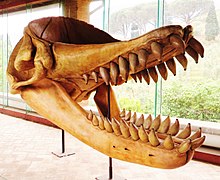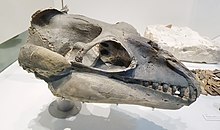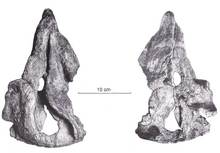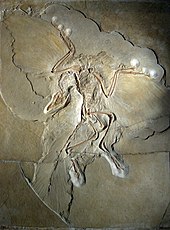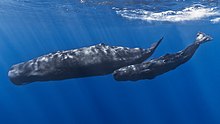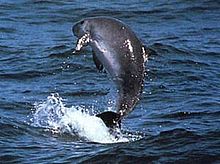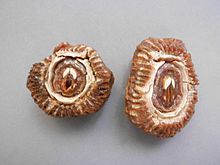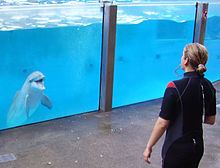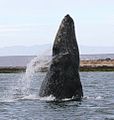Portal:Cetaceans
The Cetaceans Portal

Cetacea (/sɪˈteɪʃə/; from Latin cetus 'whale', from Ancient Greek κῆτος (kêtos) 'huge fish, sea monster') is an infraorder of aquatic mammals belonging to the order Artiodactyla that includes whales, dolphins and porpoises. Key characteristics are their fully aquatic lifestyle, streamlined body shape, often large size and exclusively carnivorous diet. They propel themselves through the water with powerful up-and-down movement of their tail which ends in a paddle-like fluke, using their flipper-shaped forelimbs to maneuver.
While the majority of cetaceans live in marine environments, a small number reside solely in brackish water or fresh water. Having a cosmopolitan distribution, they can be found in some rivers and all of Earth's oceans, and many species inhabit vast ranges where they migrate with the changing of the seasons.
Cetaceans are famous for their high intelligence, complex social behaviour, and the enormous size of some of the group's members. For example, the blue whale reaches a maximum confirmed length of 29.9 meters (98 feet) and a weight of 173 tonnes (190 short tons), making it the largest animal ever known to have existed.
There are approximately 89 living species split into two parvorders: Odontoceti or toothed whales (containing porpoises, dolphins, other predatory whales like the beluga and the sperm whale, and the poorly understood beaked whales) and the filter feeding Mysticeti or baleen whales (which includes species like the blue whale, the humpback whale and the bowhead whale). Despite their highly modified bodies and carnivorous lifestyle, genetic and fossil evidence places cetaceans as nested within even-toed ungulates, most closely related to hippopotamus within the clade Whippomorpha. (Full article...)
Selected picture

When spyhopping, a whale rises and holds a vertical position partially out of the water, often exposing its entire rostrum and head. It is visually akin to a human treading water. Spyhopping is controlled and slow, and can last for minutes at a time if the whale is sufficiently inquisitive about whatever it is viewing.
More did you know...

- ...common dolphins, which are often seen off South Africa’s east coast, can occur in schools of several thousand. The biggest school on record was estimated to consist of about 15,000 dolphins!
- ...because whales and dolphins are streamlined to swim in water, they do not have external organs. This makes it almost impossible to tell the sex of a whale or dolphin when watching them on the sea surface.
- ...there are probably types of cetaceans that are as yet unknown. For example, the Longman's beaked whale is only known from skulls washed ashore in Somalia and Australia. It has never been seen alive!
- ...in baleen whales females are bigger than males, while in the toothed whales the males are bigger than females.
- ...the open mouth of an adult southern right whale can be two metres wide!
Things you can do..
|
|
Here are some Cetaceans WikiProject tasks you can do.
|
General images -
Did you know (auto-generated)

- ... that one can swim with humpback whales in the Niue Nukutuluea Multiple-Use Marine Park?
- ... that one of the first researchers to propose dolphin-assisted therapy for humans later renounced it?
- ... that Celia Kaye won the Golden Globe Award for Most Promising Newcomer in 1965 for her starring role in Island of the Blue Dolphins?
- ... that the South Asian river dolphin is nearly blind and relies on echolocation for navigation?
Selected media
List articles
Related portals
WikiProjects

The content you are reading was created by Wikipedia volunteers. See WikiProject Cetaceans for more.
- See also: Wikispecies, a Wikimedia project dedicated to the classification of species.
Cetacean articles
Categories
For additional lists of marine life-related featured articles and good articles see:
Associated Wikimedia
The following Wikimedia Foundation sister projects provide more on this subject:
-
Commons
Free media repository -
Wikibooks
Free textbooks and manuals -
Wikidata
Free knowledge base -
Wikinews
Free-content news -
Wikiquote
Collection of quotations -
Wikisource
Free-content library -
Wikispecies
Directory of species -
Wikiversity
Free learning tools -
Wikivoyage
Free travel guide -
Wiktionary
Dictionary and thesaurus


